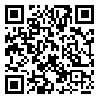Volume 21, Issue 1 (Spring- In Press 2026)
Salmand: Iranian Journal of Ageing 2026, 21(1): 0-0 |
Back to browse issues page
Download citation:
BibTeX | RIS | EndNote | Medlars | ProCite | Reference Manager | RefWorks
Send citation to:



BibTeX | RIS | EndNote | Medlars | ProCite | Reference Manager | RefWorks
Send citation to:
Mardany Z, Tarrahi M J, Fathian Dastgerdi Z. The Effectiveness of the Educational program on Social Cognitive Theory on the level of Physical Activity of the Elderly in Isfahan City. Salmand: Iranian Journal of Ageing 2026; 21 (1)
URL: http://salmandj.uswr.ac.ir/article-1-2962-en.html
URL: http://salmandj.uswr.ac.ir/article-1-2962-en.html
1- Department of Health Education and Promotion, School of Health, Isfahan University of Medical Sciences, Iran.
2- Department of Epidemiology and Biostatistics, School of Health, Anesthesiology and Critical Care Research Center, School of Health, Isfahan University of Medical Science, Iran.
3- Department of Health Education and Promotion, School of Health, Isfahan University of Medical Sciences, Iran. ,mitra_fathian@yahoo.com
2- Department of Epidemiology and Biostatistics, School of Health, Anesthesiology and Critical Care Research Center, School of Health, Isfahan University of Medical Science, Iran.
3- Department of Health Education and Promotion, School of Health, Isfahan University of Medical Sciences, Iran. ,
Abstract: (1861 Views)
Objectives: Promoting physical activity in the elderly can help create and maintain an active lifestyle. Utilizing cognitive strategies is an important part of physical activity interventions. The aim of this study was to investigate the effect of an educational intervention based on social cognitive theory on physical activity scores of the elderly in Isfahan.
Materials and Methods: In this quasi-experimental study, eighty-eight elderly people referring to health centers in Isfahan in 1403 were selected using multi-stage cluster sampling method and randomly assigned to two intervention and control groups. The program included 6 educational sessions based on social cognitive theory in the intervention group (n=44). The researcher-made questionnaires of cognitive factors affecting physical activity of the elderly and the Physical Activity Standard of the Elderly (PASE) were distributed and completed in the two groups before, 3 and 12 months after the intervention. Finally, t-tests, RM-ANOVA and MANCOVA in SPSS23 were used to analyze the data.
Results: The mean age and gender distribution of the study participants was (68.74±7.49) and (44 females, 44 males). The results showed that the mean scores of physical activity participation, self-efficacy, perceived social support, expectation, and outcome value in the intervention group increased significantly compared to the control group after the intervention (P<0.001). The largest effect sizes 3 and 12 months after the intervention were related to physical activity participation (Eta2=0.836) and (Eta2=0.824), self-efficacy (Eta2=0.828) and (Eta2=0.781), and perceived social support (Eta2=0.702) and (Eta2=0.715), respectively.
Conclusions: The findings show that implementing an educational intervention based on social cognitive theory, emphasizing the role of self-efficacy and social support, improved the participation of the elderly in physical activities.
Materials and Methods: In this quasi-experimental study, eighty-eight elderly people referring to health centers in Isfahan in 1403 were selected using multi-stage cluster sampling method and randomly assigned to two intervention and control groups. The program included 6 educational sessions based on social cognitive theory in the intervention group (n=44). The researcher-made questionnaires of cognitive factors affecting physical activity of the elderly and the Physical Activity Standard of the Elderly (PASE) were distributed and completed in the two groups before, 3 and 12 months after the intervention. Finally, t-tests, RM-ANOVA and MANCOVA in SPSS23 were used to analyze the data.
Results: The mean age and gender distribution of the study participants was (68.74±7.49) and (44 females, 44 males). The results showed that the mean scores of physical activity participation, self-efficacy, perceived social support, expectation, and outcome value in the intervention group increased significantly compared to the control group after the intervention (P<0.001). The largest effect sizes 3 and 12 months after the intervention were related to physical activity participation (Eta2=0.836) and (Eta2=0.824), self-efficacy (Eta2=0.828) and (Eta2=0.781), and perceived social support (Eta2=0.702) and (Eta2=0.715), respectively.
Conclusions: The findings show that implementing an educational intervention based on social cognitive theory, emphasizing the role of self-efficacy and social support, improved the participation of the elderly in physical activities.
Type of Study: Applicable |
Subject:
gerontology
Received: 2024/11/02 | Accepted: 2025/03/03 | Published: 2026/03/30
Received: 2024/11/02 | Accepted: 2025/03/03 | Published: 2026/03/30
Send email to the article author
| Rights and permissions | |
 |
This work is licensed under a Creative Commons Attribution-NonCommercial 4.0 International License. |







